
Infectious Diseases
Scope & Guideline
Advancing the Frontiers of Infectious Disease Research
Introduction
Aims and Scopes
- Epidemiology and Public Health:
Focuses on the epidemiological trends and public health implications of infectious diseases, including surveillance, outbreak investigations, and the impact of health interventions. - Clinical Management and Treatment:
Investigates clinical outcomes and management strategies for infectious diseases, emphasizing therapeutic approaches, treatment guidelines, and the effectiveness of various interventions. - Microbiology and Pathogen Research:
Explores the characterization of pathogens, antimicrobial resistance, and novel diagnostic methods, contributing to the understanding of infectious agents and their interactions with hosts. - Vaccine Research and Immunology:
Covers studies on vaccine efficacy, immunogenicity, and the immune response to infectious diseases, particularly in the context of emerging pathogens and vaccination strategies. - Infectious Disease in Special Populations:
Examines the impact of infectious diseases in specific populations, including immunocompromised patients, children, and those with comorbidities, highlighting the need for tailored management approaches.
Trending and Emerging
- COVID-19 Research:
A significant increase in studies related to COVID-19, including its long-term effects, vaccine efficacy, and management strategies, showcasing the pandemic's profound impact on infectious disease research. - Antimicrobial Resistance (AMR):
Growing attention to the challenges posed by antimicrobial resistance, with research emphasizing novel treatment modalities, resistance mechanisms, and stewardship programs. - Vector-Borne Diseases:
Emerging interest in vector-borne diseases due to climate change and urbanization, highlighting the need for enhanced surveillance and preventive measures against diseases like dengue and Zika. - Mental Health Impacts of Infectious Diseases:
Increasing recognition of the psychological effects of infectious diseases, particularly in the context of COVID-19, including studies on mental health outcomes and interventions. - Global Health and Infectious Disease Dynamics:
A trend towards understanding infectious diseases in a global context, emphasizing the interconnectedness of health systems, migration, and transnational health threats.
Declining or Waning
- Traditional Infectious Disease Models:
Research centered on classical infectious disease models may be waning as newer methodologies, such as genomic and molecular approaches, gain traction in understanding disease dynamics. - Focus on Single Pathogen Studies:
There seems to be a shift away from studies concentrating solely on single pathogens, as there is increasing interest in co-infections and the interactions between multiple pathogens. - Historical Epidemiological Studies:
Research highlighting historical epidemiological data is becoming less common, as the emphasis is shifting towards real-time data analysis and modeling to address current outbreaks and public health responses.
Similar Journals

Current Treatment Options in Infectious Diseases
Transforming Patient Outcomes with the Latest Treatment Modalities.Current Treatment Options in Infectious Diseases, published by SpringerNature, is a pivotal peer-reviewed journal dedicated to advancing the field of infectious disease management and therapy. With a focus on the latest treatment modalities, this journal serves as a vital resource for researchers, healthcare professionals, and students striving to improve patient outcomes in infectious diseases. Although it is not an open-access journal, it offers valuable insights through carefully curated articles that emphasize evidence-based practices and innovative approaches in the treatment landscape. By fostering a cross-disciplinary dialogue, Current Treatment Options in Infectious Diseases aims to bridge the gap between research and clinical application, making it an essential platform for staying abreast of developments in this rapidly evolving field.
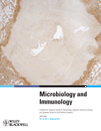
MICROBIOLOGY AND IMMUNOLOGY
Exploring the Frontiers of Microbial and Immune ScienceMICROBIOLOGY AND IMMUNOLOGY, an esteemed journal published by WILEY, serves as a vital resource for researchers and professionals in the fields of microbiology, immunology, and virology. With its ISSN 0385-5600 and E-ISSN 1348-0421, this journal has been a cornerstone in scientific literature since its inception in 1977, bridging decades of research and innovation through its comprehensive coverage of emerging trends and discoveries. Although this journal operates without open access, it maintains a commendable presence in academic circles, reflected in its 2023 Quartile rankings of Q3 across the categories of Immunology, Microbiology, and Virology. As part of an important discourse in these disciplines, MICROBIOLOGY AND IMMUNOLOGY ensures its scholarly contributions are relevant to both seasoned researchers and emerging scholars. Positioned in a competitive journal landscape, with Scopus ranks indicating a median percentile across its fields, it remains committed to advancing knowledge through peer-reviewed articles, thereby supporting the continuous evolution of its focus areas. The journal's current scope encompasses topics critical for understanding pathogen-host interactions and the immune response, making it a crucial publication for any academic library or individual scholar dedicated to the biological sciences.

Archives of Clinical Infectious Diseases
Advancing the Frontiers of Infectious Disease ResearchArchives of Clinical Infectious Diseases is a peer-reviewed journal dedicated to advancing knowledge in the field of infectious diseases, published by BRIEFLAND in Iran. With a broad scope, it covers various aspects of cardiology, critical care, immunology, microbiology, public health, and toxicology, affirming its relevance in today's health landscape. Despite the lack of open access options, the journal maintains a strong reputation, reflected in its Q3 ranking in multiple categories within the 2023 category quartiles. The journal aims to provide a platform for researchers and practitioners to disseminate critical findings that can impact clinical practices and public health policies. Its commitment to rigorous peer review ensures that only high-quality research is published, thereby serving as an essential resource for professionals, students, and public health advocates. For those engaged in the ever-evolving world of infectious diseases, Archives of Clinical Infectious Diseases stands as a vital contribution to the medical literature.
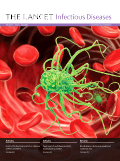
LANCET INFECTIOUS DISEASES
Unraveling Complexities in Infectious Disease ScienceLANCET INFECTIOUS DISEASES is a premier journal published by Elsevier Science Ltd, dedicated to disseminating high-quality research and comprehensive reviews in the field of infectious diseases. Since its inception in 2001, the journal has become a pivotal resource in the medical community, recognized for its rigorous peer-review process and impactful contributions to public health. With an impressive Scopus rank of #2 out of 344 in the category of Medicine - Infectious Diseases, it consistently ranks in the 99th percentile, highlighting its importance and influence in shaping clinical and epidemiological research. The journal's commitment to advancing knowledge in infectious diseases is underscored by its Q1 quartile designation in 2023, affirming its status as a leading academic outlet. Although not an open-access journal, LANCET INFECTIOUS DISEASES provides essential insights for researchers, healthcare professionals, and students, bridging the gap between cutting-edge research and practical application in an increasingly interconnected world.
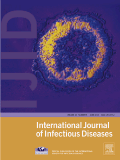
INTERNATIONAL JOURNAL OF INFECTIOUS DISEASES
Elevating the discourse on infectious disease science.INTERNATIONAL JOURNAL OF INFECTIOUS DISEASES, published by ELSEVIER SCI LTD, stands as a leading platform in the realm of infectious diseases, contributing significantly to the global understanding of this critical field. With an impressive impact factor, the journal maintains a distinguished Q1 ranking across various categories, including Infectious Diseases, Medicine (miscellaneous), and Medical Microbiology, demonstrating its high relevance and influence among contemporary research. Since its inception in 1996, it has embraced an Open Access model, allowing for wider dissemination of essential research findings that can inform public health policies and clinical practices. With a commitment to advancing scientific knowledge, this journal is not only a vital resource for researchers and professionals but also serves as an invaluable educational tool for students interested in the complexities of infectious diseases and their management. For those looking to stay at the forefront of research and innovation in this field, the INTERNATIONAL JOURNAL OF INFECTIOUS DISEASES is an indispensable resource.
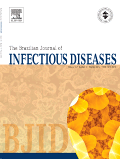
Brazilian Journal of Infectious Diseases
Pioneering research for a healthier tomorrow.The Brazilian Journal of Infectious Diseases, published by Elsevier Brazil, is a premier open-access journal dedicated to advancing research and clinical practice in the field of infectious diseases. Since its inception in 2001, this journal has been pivotal in disseminating innovative studies and reviews that inform healthcare professionals and researchers alike. With an impressive impact factor reflected by its ranking in the second quartile for Infectious Diseases and third quartile for Medical Microbiology in 2023, the journal ranks #127 out of 344 in medicine – infectious diseases and #61 out of 140 in medical microbiology, showcasing its reputable standing in the scientific community. The Brazilian Journal of Infectious Diseases invites contributions that highlight significant findings, novel methodologies, and critical reviews aimed at enhancing patient care and public health initiatives. With an international readership and a focus on pressing issues in infectious diseases, it serves as an essential platform for knowledge exchange and collaboration among scholars and practitioners across Brazil and beyond. By reinforcing the importance of open access to scientific literature, this journal not only promotes transparency but also enhances the global discourse surrounding infectious diseases.

INFECTION
Exploring Innovations in Infection MedicineINFECTION is a prestigious journal, published by Springer Heidelberg, that serves as a leading platform for the dissemination of critical research in the fields of Infectious Diseases, Microbiology, and Medicine. With an impressive Q1 ranking in multiple categories such as Infectious Diseases, Medicine (miscellaneous), and Medical Microbiology, the journal is recognized for its high-quality content and impactful contributions to the scientific community, as evidenced by its Scopus rankings placing it in the top 10th percentiles. Since its inception in 1973, and projected to continue until 2024, INFECTION has established itself as a vital resource for researchers, healthcare professionals, and students keen to explore the latest findings and advancements in infectious diseases. The journal provides a rigorous peer-review process, ensuring that only high-quality studies are published, making it an essential read for those seeking to deepen their understanding and stay abreast of the rapidly evolving landscape in infection research.

Reviews and Research in Medical Microbiology
Unveiling Innovations in Infectious Disease ResearchReviews and Research in Medical Microbiology is a premier academic journal published by LIPPINCOTT WILLIAMS & WILKINS, focusing on groundbreaking research and comprehensive reviews that advance the understanding of medical microbiology. With an ISSN of 2770-3150 and an E-ISSN of 2770-3169, this journal serves as an essential resource for researchers, healthcare professionals, and students dedicated to the study of pathogens, infectious diseases, and microbial mechanisms affecting health. While the journal currently does not offer open access, its rigorous peer-review process ensures that only high-quality, impactful research is disseminated to the scientific community. The journal aims to bridge gaps in knowledge by presenting cutting-edge studies that explore novel therapeutic strategies, diagnostic methods, and the evolving landscape of microbial resistance. Nestled in the heart of Philadelphia, this journal proudly contributes to the advancement of medical microbiology and is an indispensable platform for the publication of critical findings that shape clinical practices and research trajectories in the field.

ENFERMEDADES INFECCIOSAS Y MICROBIOLOGIA CLINICA
Exploring the frontiers of microbial research and clinical practice.ENFERMEDADES INFECCIOSAS Y MICROBIOLOGIA CLINICA is a prominent journal dedicated to the fields of infectious diseases and clinical microbiology, published by EDICIONES DOYMA S A in Spain. With an ISSN of 0213-005X and an e-ISSN of 1578-1852, the journal has been a cornerstone of research and scholarly communication since its inception in 1989. As of 2023, it holds a Q3 category ranking in Infectious Diseases, highlighting its significance in the field, alongside a Q4 ranking in the related area of Microbiology. Although the journal is not open access, it remains an essential resource for professionals, researchers, and students aiming to stay informed on advancements and studies that impact clinical practices in infectious diseases. With Scopus ranks indicating a percentile ranking in the 20th to 34th range across various sub-disciplines, ENFERMEDADES INFECCIOSAS Y MICROBIOLOGIA CLINICA continually contributes to the dialogue and development of science, fostering a deeper understanding of complex microbial interactions and disease mechanisms.
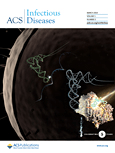
ACS Infectious Diseases
Transforming Knowledge into Practice in Infectious DiseasesACS Infectious Diseases is a premier journal in the field of infectious diseases, published by the American Chemical Society. With an impressive Impact Factor that places it in the Q1 category for Infectious Diseases in 2023, the journal serves as an essential resource for researchers, healthcare professionals, and students dedicated to the study of infectious agents and their impact on public health. Established in 2015, the journal is committed to publishing cutting-edge research that enhances our understanding of infectious diseases and fosters the development of innovative interventions. Although not an open access journal, it provides a platform for high-quality research that influences policies and practices in the field. With an address located at 1155 16TH ST, NW, WASHINGTON, DC 20036, ACS Infectious Diseases is an authoritative voice in advancing the science and practice of infectious disease management.